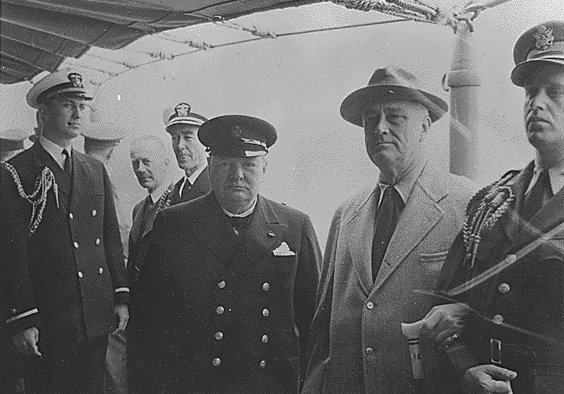Atlantic Charter
With the 70th anniversary of Pearl Harbor on the horizon, we turn our attention to the eve of US involvement in the war that changed the world. This entry by the Museum’s Senior Director of History & Research, Keith Huxen, is just one of many historical essays on 70th anniversaries we will be posting in coming years. You can also keep up with significant dates by following the Museum’s Twitter feed, @wwiitoday.
The Atlantic Charter: 70th Anniversary, August 14, 1941
In the summer of 1941 the historical pathway of the Second World War was rapidly changing. In Asia, Japan found herself still struggling after four years to complete and consolidate her conquests in China without recourse or access to the raw materials spread further across the Southeast Asian archipelago. Pressure in the European war was also reaching critical mass. Great Britain, having survived the previous summer by fending off Operation Sea Lion, Hitler’s planned invasion across the English Channel, had continued to fight Germany alone. Unable to complete Britain’s defeat by late October 1940, Hitler gambled and unleashed Operation Barbarossa, the German invasion and double-cross of the Soviet Union. The Germans believed that total victory over the USSR could be completed in six months. Germany’s gamble would achieve four great objectives: Soviet defeat would rob Britain of her last potential European ally and force Britain to a separate peace; Hitler would eliminate the Soviet Communist regime which he regarded as his great ideological enemy; Hitler would acquire through invasion the vast Lebensraum or eastern living space in Ukraine where he intended to build a purely Aryan empire; and last, as the German army acquired and controlled the territories of Eastern Europe, Hitler would gain control of two-thirds of Europe’s Jewish population (along with other racial undesirables in the Nazi lexicon) which he intended to extinguish from European life. Unleashed on June 22, 1941, the Nazi invasion and strategy appeared to have a good chance of success as the Nazis drove deep into Soviet territories.
Despite a long and dedicated political opposition to Communism, Britain’s Prime Minister Winston Churchill immediately welcomed Joseph Stalin and the Soviets as an ally in the fight against Nazism. When questioned on his political pivot, Churchill famously observed that “if Hitler invaded Hell, I would at least make a favorable reference to the Devil.”



